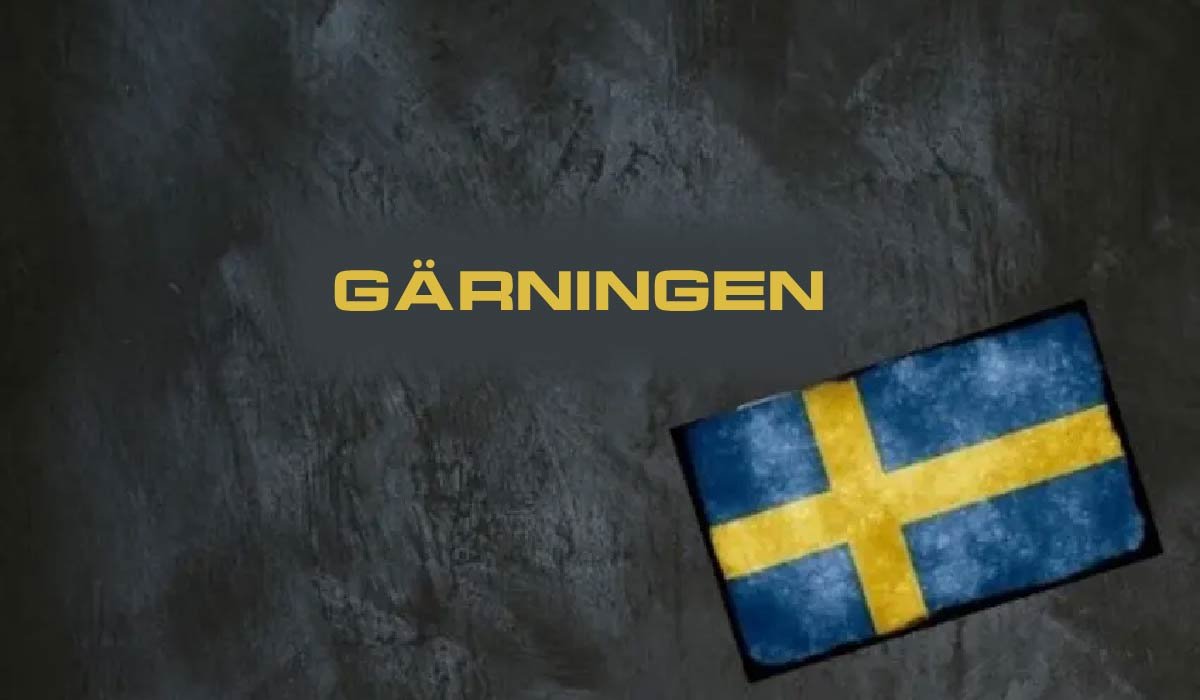What Does Gärningen Mean and Why Is It Important?
The Swedish word “gärningen” translates to “the act” or “the deed” in English. While this seems simple at first glance, the word holds deeper cultural, legal, and emotional significance in Swedish society. It is a word that carries weight, often tied to critical events or decisions. It doesn’t describe just any action—it is used to define a meaningful, often life-changing event, whether positive or negative.
In Sweden, this term appears in legal documents, crime reports, novels, news headlines, TV dramas, and even online memes. When someone says “gärningen,” they are pointing to something specific and serious, not just a casual occurrence. This article will explore every important detail of this powerful word, from its roots and grammar to its role in law, culture, and storytelling.
Etymology and Linguistic Origin of Gärningen
The word “gärningen” comes from the Old Norse word “gerningr,” which also meant act or deed. Over time, as Swedish developed as a language, it evolved from “göra” (to do) into “gärning” (deed), and finally “gärningen” (the deed, in definite singular form). Grammatically, “gärning” is a common gender noun in Swedish and follows regular noun patterns. The forms are: “en gärning” (an act), “gärningen” (the act), “gärningar” (acts), and “gärningarna” (the acts).
This makes it relatively easy to use within Swedish grammar, yet its usage always carries deeper meaning. Its transformation from Viking language to modern usage also reflects how Swedish culture has always emphasized accountability and meaningful action.
The Legal Meaning of Gärningen in Swedish Law
In Swedish criminal law, “gärningen” plays a central role. It is used to describe the specific act that is being judged in a courtroom. Legal documents, police reports, and court discussions focus heavily on the nature of the “gärning.” For example, legal professionals differentiate between “uppsåtlig gärning” (intentional act) and “oaktsam gärning” (negligent act). This distinction is important because the punishment may vary based on whether the person meant to commit the act or if it happened due to carelessness.
Phrases such as “på bar gärning” (caught in the act), “tidpunkten för gärningen” (time of the act), and “motivet bakom gärningen” (motive behind the act) are frequently used in criminal cases. The law in Sweden places significant importance on identifying what exactly was done and why, making “gärningen” one of the most commonly used legal terms in the justice system.
Gärningen in Crime Reports and News Media
Swedish media often uses the word “gärningen” when reporting serious crimes or impactful events. It adds a tone of formality and gravity to the report. Headlines like “Spår efter gärningen hittades” (Traces of the act were found) or “Gärningen skakade hela staden” (The act shook the entire city) are common in newspapers and TV news. These headlines don’t just describe what happened—they capture the public’s attention and focus on the act itself.
Swedish media, especially in crime journalism, avoids dramatizing the criminal and instead keeps the story centered on what was done, which aligns with the cultural focus on deeds over personality. This style of reporting builds trust and allows the public to form judgments based on actions, not speculation.
Gärningen in Swedish Literature and Fiction
In Swedish literature, particularly in genres like crime fiction, psychological thrillers, and historical novels, the word “gärningen” is often used to explore themes of guilt, redemption, and justice. It becomes a literary device that reveals a character’s past or moral struggle. In Nordic noir stories, detectives and characters often reflect on a gärning—a turning point, a haunting memory, or a mystery that must be solved.
Famous Swedish authors such as Maj Sjöwall and Per Wahlöö, or Henning Mankell, used this word not just to describe criminal acts but also to underline the emotional or psychological weight of a person’s actions. Gärningen, in literature, transforms into a symbol of conscience and consequence, making it a rich word for storytelling and character development.
Cultural and Moral Implications of Gärningen
In Sweden, the word “gärningen” represents more than just a physical act. It reflects cultural values such as accountability, social responsibility, and integrity. Common sayings like “Gärningen talar för sig själv” (The deed speaks for itself) and “Det är gärningen som räknas” (It’s the act that counts) highlight how Swedes judge people based on what they do, not what they say. This moral code encourages people to think before they act because deeds define character. Even in schools and workplaces, Swedish people are taught to act thoughtfully and take responsibility. These values are similar to global concepts like karma or the idea that “actions speak louder than words.” In Sweden, however, this philosophy is deeply embedded in daily life, making “gärningen” a word with strong moral weight.
Gärningen vs Intention: What Matters More in Sweden?
One of the most debated topics in Swedish law and society is whether intentions or actions matter more. In many cases, gärningen—the actual act—is more important than the person’s intention. For example, if someone causes harm unintentionally, the legal and social system still focuses on the consequences of the act.
This is where phrases like “han stod för sin gärning” (he owned up to his deed) become meaningful. Owning up to one’s action—even if unintentional—is viewed as a sign of maturity and honesty.
Although courts and society still take intent into account, the outcome of the gärning often takes center stage. This approach supports a justice system that values fairness, accountability, and community safety.
Psychological and Social Impact of Gärningen
A single gärning—whether positive or negative—can leave lasting effects on individuals and communities. Victims of crime often experience long-term trauma, and society at large may rally or react depending on the severity of the act. For instance, a violent gärning in a peaceful town can spark national debate, protests, or legislative changes.
Conversely, a heroic gärning such as saving someone from danger can inspire social movements or public honors. In both cases, the act itself becomes a symbol of change, resilience, or tragedy. Swedish society uses such acts as case studies, learning opportunities, and even inspiration for reform. This demonstrates how “gärningen” shapes not only individual lives but also collective memory and behavior.
How Gärningen Is Used in Swedish Pop Culture and Memes
Despite its serious roots, “gärningen” has also found its place in modern internet culture. In Swedish memes, jokes, and online storytelling, the word is often used humorously to describe minor mischiefs. For example, a photo of a dog knocking over a vase might be captioned “Gärningen är klar” (The act is done).
Or a cat caught on camera eating food from a table might be jokingly referred to as being caught “på bar gärning.” Young Swedes enjoy using formal or serious words like “gärningen” in ironic ways, making the language feel alive and flexible. This dual use—serious in courtrooms and funny on TikTok—proves how deeply integrated the word is in Swedish society.
Gärningen in Religion and Philosophy
The roots of Swedish Lutheran philosophy emphasize that faith must be shown through good deeds. This idea that action is more important than empty words fits perfectly with the concept of “gärningen.” Religious teachings in Sweden have long encouraged people to live ethically and take responsibility for their actions. In philosophical terms, you are what you do, not what you say you believe. Even in secular society, many Swedes follow this unspoken rule that actions must reflect values.
Thus, gärningen becomes a moral compass, a way to measure personal integrity and community contribution. Whether religious or not, most people in Sweden hold this belief close: good intentions matter, but only deeds can create a real impact.
Everyday Usage of Gärningen in Conversations
While “gärningen” is often used in legal or media contexts, it also appears in daily conversations, especially when referring to serious or memorable events. For example, someone might say, “Den gärningen förändrade allt” (That act changed everything) when talking about a big decision.
It is different from other Swedish words like “handling” or “akt,” which may refer to general actions or parts of a performance. “Gärningen” always implies seriousness, consequence, or moral meaning.
The tone of the conversation changes depending on whether the act was heroic, criminal, or tragic. This makes the word powerful even in casual talk, as it is used to highlight the significance of a deed in someone’s life story.
Pronunciation Guide for Gärningen
The correct way to pronounce “gärningen” in Swedish is /ˈjæːɳɪŋɛn/. It consists of three syllables: “gär” (like the English word “year” but with a flat “ä” as in “cat”), “ning” (rhyming with “sing”), and “en” (a soft, unstressed ending like “in”). Together, it sounds like “YAIR-ning-en.”
To master the pronunciation, it’s best to listen to native Swedish speakers on YouTube, language apps, or TV shows. Pronouncing this word correctly adds depth to your understanding of Swedish, and it’s also essential if you’re discussing legal or cultural topics with locals.
Real-Life Examples and Sentences
To fully understand how to use “gärningen,” here are some real-world examples. In a legal context: “Han greps på bar gärning” (He was caught in the act). In a heroic context: “Hennes gärning räddade livet på många” (Her deed saved many lives). In a general, everyday context: “Små gärningar av vänlighet gör världen bättre” (Small acts of kindness make the world better).
These examples show how the word adapts to different situations while always maintaining its importance. It adds depth and clarity to what would otherwise be simple sentences.
Gärningen as a Tool for Social and Legal Reform
There have been many cases in Sweden where a single gärning has led to significant legal or social reform. Crimes that shocked the public have pushed lawmakers to revise laws on domestic violence, hate crimes, and environmental protection. For example, public outrage over a violent gärning may lead to stricter sentencing guidelines or better victim support systems.
On the other hand, positive gärningar, like acts of protest or civil disobedience, have inspired movements for equality and justice. This makes “gärningen” not just a word but a symbol of transformation and progress in Swedish society.
Global Recognition of Gärningen Through Media
Thanks to the rise of Swedish crime dramas and Nordic noir novels, the word “gärningen” is now recognized beyond Sweden’s borders. In translated shows like “The Bridge” or “Wallander,” subtitles often use “the act” or leave the original word in Swedish to keep the cultural flavor.
As these shows grow in popularity, so does interest in the Swedish language and its unique legal terms. Global audiences are beginning to understand and respect how Sweden frames justice, accountability, and morality—often through the lens of gärningen.
Conclusion
The word “gärningen” may seem like a simple noun, but in Swedish life, it means much more. It reflects the nation’s values of truth, justice, responsibility, and moral clarity. Whether in a courtroom, a novel, or an online meme, gärningen keeps the focus on what matters most—what was actually done.
For language learners, cultural enthusiasts, and global citizens, understanding this word opens the door to deeper insights about Swedish law, ethics, and daily life. In the end, the lesson is clear: our actions define us. And in Sweden, they have a word for that—gärningen.
FAQs
1. What does “gärningen” mean in Swedish?
Gärningen is a Swedish word that means “the act” or “the deed.” It usually refers to a serious action, like a crime or a meaningful event. It is used in law, media, and literature in Sweden.
2. Is “gärningen” only used for crimes?
No, gärningen can describe both positive and negative actions. While it is often used in crime reports, it can also refer to heroic deeds, kind acts, or important life events.
3. How is “gärningen” used in Swedish law?
In Swedish law, gärningen describes the specific act for which someone is being judged. It helps define what happened, how it happened, and whether the person meant to do it or not. It’s a keyword in courtrooms and police reports.
4. What is the difference between “gärningen” and “intention”?
Gärningen means what was done, while intention (avsikten) means what someone meant to do. In Sweden, the deed itself is usually more important than what the person intended.
5. Can “gärningen” be used in a funny way?
Yes! In Sweden, people also use gärningen in a funny or playful way, especially online. For example, if a cat knocks over a plant, someone might say “The gärningen is complete!” as a joke.
You May Read Also: Deshoptec com: Full Guide for New Visitors









